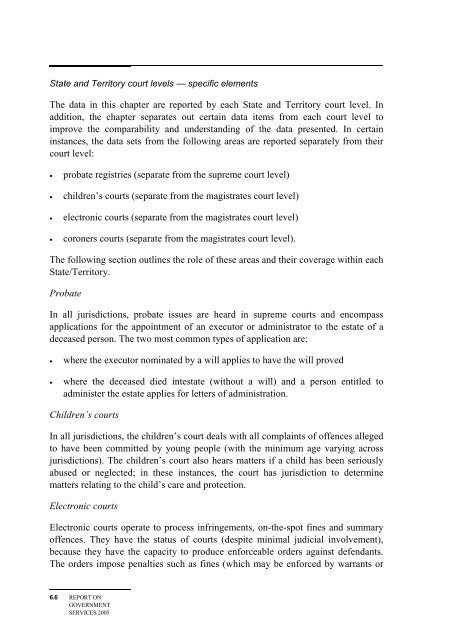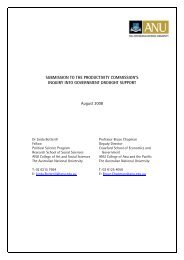PDF 0.4 MB
PDF 0.4 MB
PDF 0.4 MB
You also want an ePaper? Increase the reach of your titles
YUMPU automatically turns print PDFs into web optimized ePapers that Google loves.
State and Territory court levels — specific elements<br />
The data in this chapter are reported by each State and Territory court level. In<br />
addition, the chapter separates out certain data items from each court level to<br />
improve the comparability and understanding of the data presented. In certain<br />
instances, the data sets from the following areas are reported separately from their<br />
court level:<br />
• probate registries (separate from the supreme court level)<br />
• children’s courts (separate from the magistrates court level)<br />
• electronic courts (separate from the magistrates court level)<br />
• coroners courts (separate from the magistrates court level).<br />
The following section outlines the role of these areas and their coverage within each<br />
State/Territory.<br />
Probate<br />
In all jurisdictions, probate issues are heard in supreme courts and encompass<br />
applications for the appointment of an executor or administrator to the estate of a<br />
deceased person. The two most common types of application are:<br />
• where the executor nominated by a will applies to have the will proved<br />
• where the deceased died intestate (without a will) and a person entitled to<br />
administer the estate applies for letters of administration.<br />
Children’s courts<br />
In all jurisdictions, the children’s court deals with all complaints of offences alleged<br />
to have been committed by young people (with the minimum age varying across<br />
jurisdictions). The children’s court also hears matters if a child has been seriously<br />
abused or neglected; in these instances, the court has jurisdiction to determine<br />
matters relating to the child’s care and protection.<br />
Electronic courts<br />
Electronic courts operate to process infringements, on-the-spot fines and summary<br />
offences. They have the status of courts (despite minimal judicial involvement),<br />
because they have the capacity to produce enforceable orders against defendants.<br />
The orders impose penalties such as fines (which may be enforced by warrants or<br />
6.6 REPORT ON<br />
GOVERNMENT<br />
SERVICES 2005
















